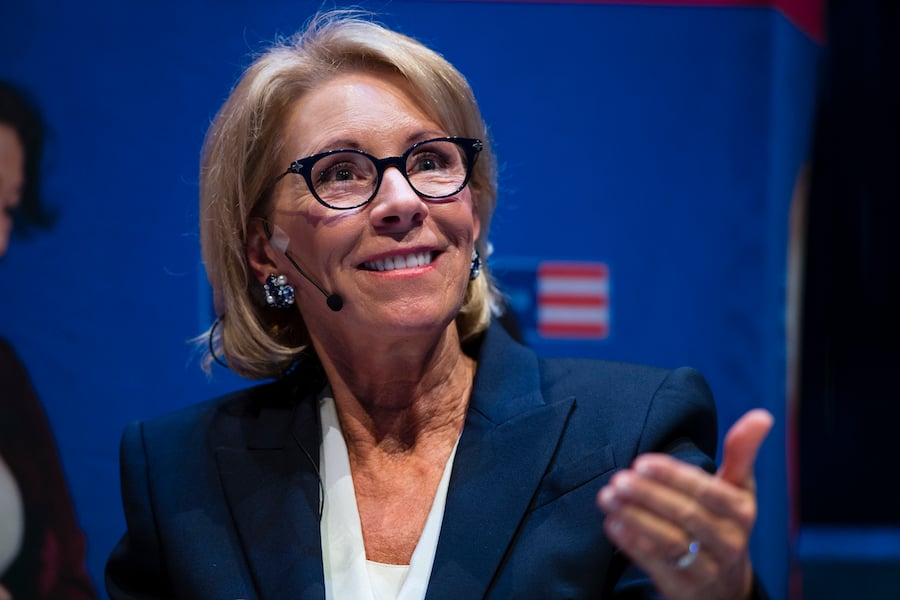SAN FRANCISCO (CN) — Challenging a new rule that makes it “virtually impossible” for defrauded student borrowers to obtain debt relief, 22 states and the District of Columbia sued Education Secretary Betsy DeVos in federal court Wednesday.
The lawsuit, led by attorneys general from Massachusetts and California and filed in San Francisco federal court, claims the U.S. Department of Education relied on “inaccurate, unsupported and inconsistent” evidence when it revamped an Obama-era rule that gave deceived students a pathway to get their loan debt canceled.
“We’re suing because this rule is nothing more than a free pass for abusive schools to continue defrauding students,” Massachusetts Attorney General Martha Healy said during a press call Wednesday.
Enacted in 2015 by the Obama administration, the borrower defense rule offered students who attended predatory for-profit colleges an avenue to have their loan debt forgiven. The rule was enacted as the government started cracking down on for-profit schools including ITT Technical Institute, Corinthian Colleges and DeVry University, which were investigated for deceiving students about post-graduation job prospects.
After several failed attempts to delay enforcement of the Obama-era rule, DeVos introduced a new package of regulations in September 2019 that limits the ways in which students can prevail on their borrower defense claims. The new rule forbids granting debt relief based on a school’s violations of state consumer protection laws or negligent misrepresentations about the value of educational programs.
To obtain debt relief, borrowers must prove a school knowingly or recklessly misrepresenting the truth and that the student suffered financial harm as a result. When demonstrating financial harm, the borrowers must prove their unemployment is “unrelated to national or local economic recessions” and that the failure to maintain employment is not due to issues unrelated to their education. The rule also sets a three-year statute of limitations for students to obtain debt relief, a time limit that California and other states have denounced as “arbitrary.”
The plaintiffs complain the three-year limit will prevent most students from seeking debt relief. The Education Department reports that 30% of borrower defense claims were filed within three years of students leaving an institution. Because 67% of borrowers filed claims within five years, the department predicted the new rule will incentivize more borrowers to file claims within three years, resulting in 70% of claims being filed on time. The suing states say the department provided no evidence to support that prediction.
The rule also eliminates a “group discharge” process that previously allowed students with claims against the same for-profit school program to be processed together. The new rule requires identical claims be filed and processed separately.
DeVos also abolished restrictions on the use of class action waivers and arbitration agreements by for-profit schools. Those legal mechanisms prevent student borrowers from suing as a class or individually. Despite receiving public comments about the imbalance of power between individual students and for-profit schools that can hire high-quality legal counsel, the Education Department concluded class actions “benefit the wrong individuals, that is, lawyers and not wronged students.”
The rule rescinds requirements that schools disclose loan repayment rates, which were intended to inform potential students if most people attending a particular school can repay their loans. The department said any benefit from such disclosures are canceled out by the fact that nonprofit and public universities are not required to release the same information. The department also defended eliminating additional financial disclosure requirements because they “could tarnish the reputation” of for-profit schools.
Taken together, the plaintiffs say these changes remove critical incentives for for-profit schools to avoid misconduct by making it harder to hold the schools accountable for their actions.
“The true intended beneficiary of the 2019 Rule is the for-profit school industry,” the complaint states. “The 2019 Rule expresses special solicitude for these private businesses, seeking to protect their reputations, and to spare them accountability for their violations of state and federal law.”
The lawsuit claims the rule was enacted in an arbitrary and capricious manner in violation of the Administrative Procedure Act. It seeks a court order invalidating the regulations.
States joining California and Massachusetts as plaintiffs include Colorado, Connecticut, Delaware, Hawaii, Illinois, Maine, Maryland, Michigan, Minnesota, Nevada, New Jersey, New Mexico, New York, North Carolina, Oregon, Pennsylvania, Rhode Island, Vermont, Virginia, Wisconsin, and the District of Columbia.
In an emailed statement, the Education Department denounced the lawsuit as a political stunt.
“This is yet another grandstanding, politically driven lawsuit meant to grab a cheap headline, and the media seems to always oblige,” Education Department spokeswoman Angela Morabito said. “To any objective observer, our borrower defense rule clearly protects students from fraud, ensures they are entitled to financial relief if they suffered harm and holds schools accountable.”
Subscribe to Closing Arguments
Sign up for new weekly newsletter Closing Arguments to get the latest about ongoing trials, major litigation and hot cases and rulings in courthouses around the U.S. and the world.









